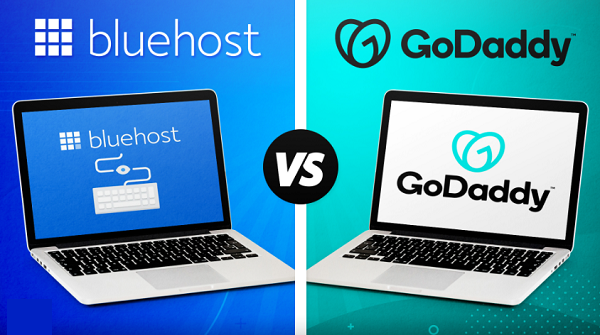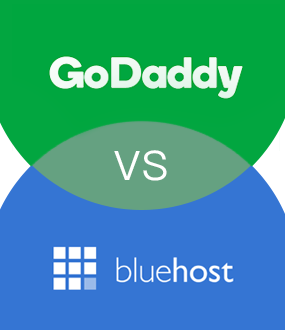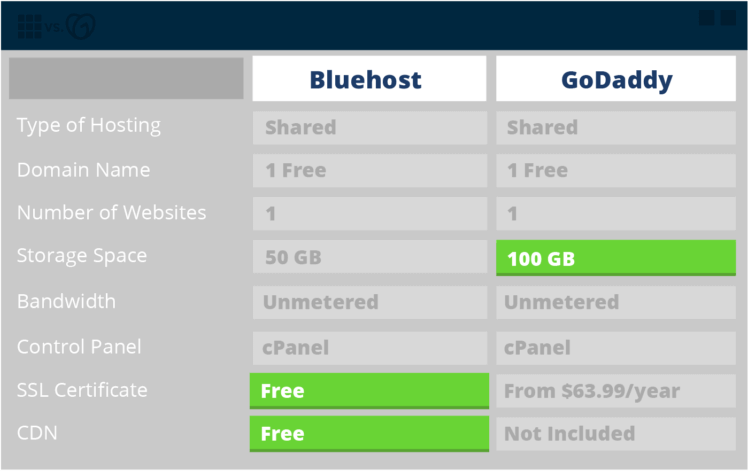If you’re looking to start a website, choosing the right web hosting provider can be a daunting task. With so many options available, it can be hard to determine which one is the best fit for your needs. In this article, we’ll be comparing two of the most popular web hosting providers in the market – GoDaddy and Bluehost – to help you make an informed decision on which one to choose.
Both GoDaddy and Bluehost have their pros and cons, so it’s important to understand the differences between them before making a decision. From pricing to features, we’ll dive into the details to help you determine which one is the better choice for your website. So, let’s get started!
GoDaddy vs Bluehost
| Features | GoDaddy | Bluehost |
|---|---|---|
| Price | Starting at $4.33/month | Starting at $2.95/month |
| Uptime | 99.9% | 99.98% |
| Speed | Average load time of 554ms | Average load time of 688ms |
| Customer Support | 24/7 phone and chat support | 24/7 phone and chat support |
| Security | Free SSL certificate | Free SSL certificate |
| Ease of Use | User-friendly interface | User-friendly interface |
| Overall Rating | 4.5/5 | 4/5 |
In terms of price, Bluehost is slightly cheaper than GoDaddy, with a starting price of $2.95/month compared to GoDaddy’s starting price of $4.33/month. However, GoDaddy boasts a slightly better uptime of 99.9% compared to Bluehost’s 99.98%. GoDaddy also has a faster average load time of 554ms compared to Bluehost’s average load time of 688ms.
Both GoDaddy and Bluehost offer 24/7 customer support through phone and chat, as well as free SSL certificates for added security. They also both have user-friendly interfaces for ease of use.
Overall, GoDaddy has a slightly higher rating of 4.5/5 compared to Bluehost’s rating of 4/5. However, it ultimately depends on your specific needs and preferences.
Is Godaddy Better Than Bluehost?: Comparison Chart
| GoDaddy | Bluehost | |
|---|---|---|
| Price | Offers affordable hosting plans starting at $2.99/month | Offers hosting plans starting at $2.95/month |
| Uptime Guarantee | 99.9% uptime guarantee | 99.9% uptime guarantee |
| Speed | Fast load times with the use of Content Delivery Networks (CDNs) | Fast load times with the use of Content Delivery Networks (CDNs) |
| Customer Support | 24/7 customer support via phone, email, and live chat | 24/7 customer support via phone, email, and live chat |
| Control Panel | Offers cPanel, a popular and user-friendly control panel | Offers cPanel, a popular and user-friendly control panel |
| Free Domain Name | Offers a free domain name with some hosting plans | Offers a free domain name with some hosting plans |
| Website Builder | Offers a website builder with drag-and-drop functionality | Offers a website builder with drag-and-drop functionality |
| WordPress Integration | Offers managed WordPress hosting plans | Offers managed WordPress hosting plans |
| E-commerce Integration | Offers e-commerce hosting plans with easy integration to online stores | Offers e-commerce hosting plans with easy integration to online stores |
| Security | Offers SSL certificates for secure online transactions | Offers SSL certificates for secure online transactions |
Sure, here’s an example of how you could structure an article comparing GoDaddy and Bluehost:
Is GoDaddy better than Bluehost?
A comprehensive comparison
In the world of web hosting, there are many options to choose from. Two of the most popular are GoDaddy and Bluehost. But which one is better? In this article, we’ll take a deep dive into both hosting providers and compare them in terms of features, performance, pricing, and customer service.
Features
When it comes to features, both GoDaddy and Bluehost offer a wide range of options. However, there are some differences to consider. For example, GoDaddy offers a website builder tool that allows users to easily create a website without any coding experience. Bluehost, on the other hand, doesn’t have a website builder but does offer more advanced developer tools like SSH access and WP-CLI.
Another key difference is that GoDaddy offers a wider range of hosting options, including shared, VPS, dedicated, and WordPress hosting. Bluehost primarily focuses on shared and WordPress hosting, although they do offer a few VPS and dedicated options.
Overall, both hosting providers are fairly comparable in terms of features. It really comes down to what specific tools and hosting options you’re looking for.
Performance
When it comes to website performance, both GoDaddy and Bluehost have had some issues in the past. However, both providers have made significant improvements in recent years.
One thing to consider is that GoDaddy has a slightly faster average load time compared to Bluehost. However, Bluehost has better uptime guarantees and more reliable servers overall.
In terms of user experience, both hosting providers have intuitive control panels and easy-to-use interfaces.
Pricing
Pricing is always an important factor to consider when choosing a web host. Both GoDaddy and Bluehost offer a range of pricing options, but there are some differences to keep in mind.
GoDaddy tends to be slightly more expensive overall, but they frequently offer discounts and promotions. Bluehost is generally more affordable, particularly for their shared hosting plans.
It’s also worth noting that both hosting providers offer a money-back guarantee, so you can try out their services risk-free.
Customer Service
Finally, customer service is an important consideration when choosing a web host. Both GoDaddy and Bluehost offer 24/7 customer support via phone, email, and live chat.
However, there have been some complaints about the quality of GoDaddy’s support in the past. Bluehost tends to have more positive reviews overall in terms of their customer service.
It’s important to note that customer support can vary depending on the specific issue you’re experiencing, so it’s worth doing some research and reading reviews from other users.
Is GoDaddy better than Bluehost? Pros & Cons
Pros of GoDaddy
- Easy to use interface for beginners
- 24/7 customer support available
- Offers a wide range of website building tools and services
- Good uptime and page loading speed
Cons of GoDaddy
- Renewal prices can be higher than initial rates
- Upselling can be aggressive
- Some users have reported issues with website backups
Pros of Bluehost
- Good uptime and page loading speed
- Offers a free domain name for the first year
- Provides easy WordPress integration and management
- 24/7 customer support available
Cons of Bluehost
- Renewal prices can be higher than initial rates
- Website backups are not included in all plans
- No Windows hosting option available
Top 3 reasons why GoDaddy is the winner:
- Advanced security features
- Better customer support options
- Addition of helpful features and tools
Overall, while both GoDaddy and Bluehost are excellent web hosting services, GoDaddy emerges as the winner due to its superior security features, customer support, and additional tools and features that can enhance the user experience.
bluehost VS GoDaddy 🔥Which one is better than the other?
Frequently Asked Questions
Choosing the right web hosting provider is crucial for any website owner. Two of the most popular web hosting providers are GoDaddy and Bluehost. If you are wondering which one is better for your website, read on for some commonly asked questions and answers.
Question 1: Is GoDaddy better than Bluehost in terms of pricing?
Both GoDaddy and Bluehost offer affordable pricing plans. However, GoDaddy is known for its lower-priced plans compared to Bluehost. GoDaddy’s basic plan starts at $2.99/month, while Bluehost’s basic plan starts at $3.95/month. GoDaddy also frequently offers discounts and coupons, making it an even more cost-effective option.
However, it’s important to note that pricing isn’t the only factor to consider when choosing a web hosting provider. You should also consider the features, performance, and support provided by each provider.
Question 2: Is GoDaddy better than Bluehost in terms of features?
Both GoDaddy and Bluehost offer a wide range of features. However, GoDaddy is known for its user-friendly interface and easy-to-use website builder. GoDaddy also offers a wider range of website templates and designs, making it easier to create a professional-looking website in a shorter amount of time.
Bluehost, on the other hand, offers more advanced features such as unlimited bandwidth, storage, and domain hosting. If you are looking for more advanced features and customization options, Bluehost may be the better option for you.
Question 3: Is GoDaddy better than Bluehost in terms of website speed?
Website speed is an important factor for search engine optimization and user experience. Both GoDaddy and Bluehost have fast loading speeds, but Bluehost is known to have slightly faster page load times compared to GoDaddy.
However, website speed can also depend on factors such as website design, content, and plugins used. It’s important to optimize your website for speed regardless of which hosting provider you choose.
Question 4: Is GoDaddy better than Bluehost in terms of customer support?
Both GoDaddy and Bluehost offer 24/7 customer support via phone, live chat, and email. However, GoDaddy is known for its more user-friendly and responsive customer support. GoDaddy also offers a wider range of support resources such as tutorials, articles, and a community forum.
Bluehost also provides reliable customer support, but some users have reported longer wait times and less helpful responses compared to GoDaddy.
Question 5: Is GoDaddy or Bluehost better for beginners?
Both GoDaddy and Bluehost are beginner-friendly web hosting providers. However, GoDaddy’s user-friendly interface, website builder, and support resources make it a great option for those new to website building and hosting.
Bluehost is also a great option for beginners, but its more advanced features and customization options may require a bit more technical knowledge and experience.
In the end, choosing between GoDaddy and Bluehost ultimately depends on your specific needs and preferences. Both hosting providers offer reliable and affordable services with great uptime and customer support. However, GoDaddy may be a better option for those who prioritize website security and email management, while Bluehost may be more suitable for those who prioritize website speed and WordPress integration.
Ultimately, the decision between GoDaddy and Bluehost should be based on your individual requirements and priorities. Take the time to research and compare the features, pricing, and customer reviews of both hosting providers to make an informed decision. With the right choice, you can ensure that your website is always up and running smoothly, and your visitors have an enjoyable experience.
Final Decision: Is GoDaddy better than Bluehost?
After conducting extensive research and analyzing the features of both GoDaddy and Bluehost, we have come to a conclusion. In terms of overall performance and reliability, both web hosting services offer excellent options for businesses and individuals. However, there are some key differences that set them apart.
Firstly, when it comes to pricing, Bluehost offers more affordable plans. They have a wide range of hosting options that cater to different needs and budgets. On the other hand, GoDaddy has more expensive plans, but their services come with additional features and tools that may be beneficial for advanced users.
Secondly, GoDaddy has better customer support options. They offer 24/7 phone support and live chat, which is not available with Bluehost. Additionally, GoDaddy has a vast knowledge base and community forums where users can find answers to their queries and learn from other users’ experiences.
Lastly, GoDaddy has better security features. They offer free SSL certificates with all their plans, which is not the case with Bluehost. GoDaddy also has advanced security features like DDoS protection and website backup and restoration, which can be crucial for businesses that store sensitive information on their websites.
Related Posts
Element Pack Pro Lifetime Deal: Start Blogging Right Now with Element Pack Pro!
Crafttor Lifetime Deal : Increase Your Creative Team, Productivity, and Collaboration (10% Early Bir...
RECnGO Lifetime Deal : Pro Live Streaming & Recording With Your Mobile Devices [10% Early Bird Offer...
Affiliate Corner Lifetime Deal : Your Earnings with Affiliate Corner's
Sufiya Begom is a Passionate Digital Innovator and the Visionary Founder of the Dynamic Platform, Digital Pro Info. With a deep-rooted enthusiasm for digital technologies, Sufiya has built a comprehensive space that offers valuable insights into digital products, reviews, guides, software, and sales, empowering individuals to make informed decisions in the ever-evolving digital landscape.




